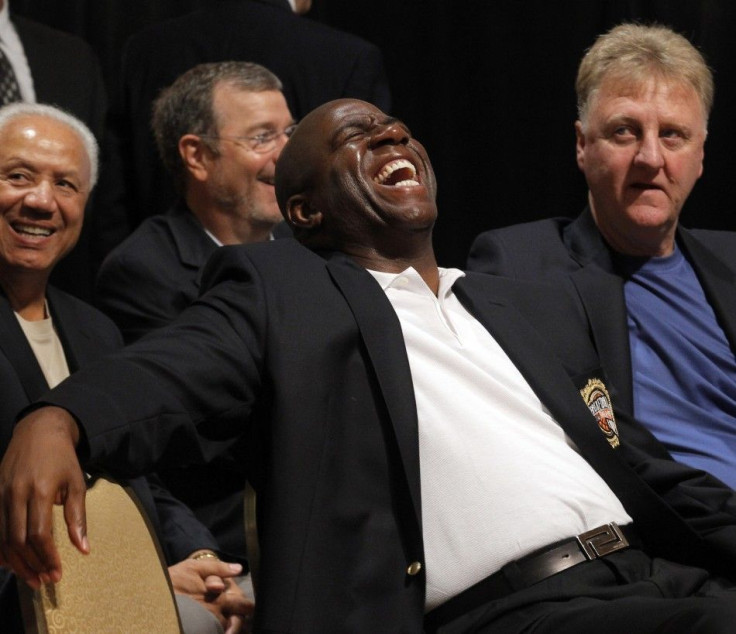Magic/Bird on Broadway Review: NBA Greatness Hard to Replicate on Stage

Sporting events and Broadway shows are not altogether different in that the best ones stir deep emotion. On the basketball court, few did it better than Magic Johnson of the Los Angeles Lakers and Larry Bird of the Boston Celtics. For more than a decade, they framed America's passion for hard work, racial conflict, regional pride and competitive spirit as well as any athletes.
On Broadway, however, the new play Magic/Bird by Eric Simonson that opened last week fails to elicit the same type of emotion that makes for good theater. The 95-minute play (no intermission) is more at times like watching the first quarter of a Golden State-Seattle NBA game than watching a championship series game seven more than a quarter-of-a-century before between Magic's Lakers and Bird's Celtics.
The ball is bouncing around the makeshift court at New York's Longacre Theatre, but one's pulse easily drifts to a different beat.
That's not to say, however, that Magic/Bird has no value. For sports fans, particularly those who lived the dramatic years when Magic and Bird put the NBA on a big global stage, the play is a fair reminder of those wonderful days gone-by when whites and blacks had a healthy competitive forum for pinning their hopes and dreams.
Whites, of course, rooted for Bird and the Celtics, while blacks rooted for Johnson and the Lakers -- yet beautifully in the end the players themselves grew to love one another.
The play, with production involvement from the NBA, relies upon that theme in obvious fashion. (It's worth noting, pehaps, for those keeping score, that in the end Magic and the Lakers won two of the team's three head-to-head championship battles on the court in the 1980s.)
Magic/Bird runs lightly through the real-life dramatic history of the on-court rivals with far less drama than one recalls from watching it all unfold years before, but the opportunity to reflect is the true accomplishment of the Broadway play brought by the team that produced Lombardi. That's probably why the theatre on a Tuesday night in the show's second week after opening was filled with an audience that doesn't fit the typical Broadway demographic. It was mostly male, and many likely haven't seen a play since Johnson retired upon announcing to the world that he is HIV-positive and Bird retired with a bad back.
It's unlikely that the performance will send them flocking to more Broadway theatres anytime soon -- they are more likely to buy tickets to a Knicks game. The actors playing Bird (Tug Coker) and Johnson (Kevin Daniels) are respectable on stage considering constraints, and the scene of a meeting that apparently did take place between the players during a Converse commercial shoot in Bird's hometown of French Lick, Indiana has hints of real theater. Yet great theater isn't the accomplishment of Magic/Bird, which ultimately reveals the deep respect if not affection the two players developed for one another over the years.
The play only glances emotion for one or two brief moments -- though the players managed to do it on the court without interruption for so many years. But it is a worthy reminder that the competition Magic and Bird once delivered was so remarkable that it perhaps cannot be replicated, in sport or on Broadway.
© Copyright IBTimes 2024. All rights reserved.





















